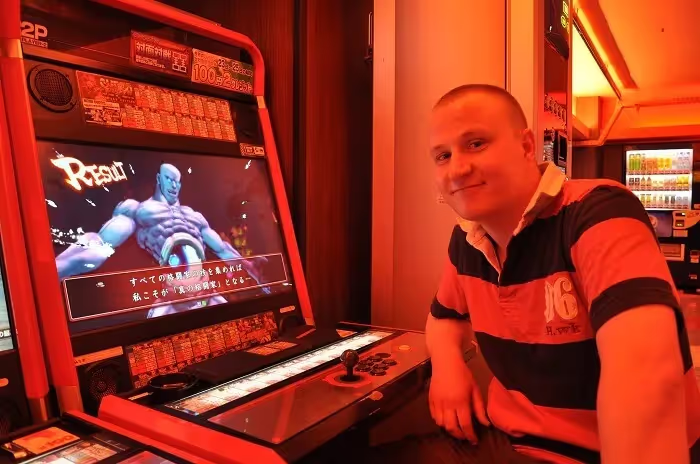The year is 2038 and androids are commonplace in the world, powered by biocomponents — their organs, basically — and Thirium 310, also known as blue blood. These specific technologies were developed by Elijah Kamski, founder of Cyberlife, the company from which all androids come. It led to Chloe, an early model which passed the Turing test in 2022. Put simply, Chloe was the first artificial intelligence in the Detroit: Become Human universe whose ability to exhibit intelligent behaviour was indistinguishable from that of a human.
Now androids are as populous as humans it seems, and they have all kinds of roles in society. You play as three characters throughout the game, each of which is an android and all of whom start out with a certain function. Connor is a prototype android from Cyberlife and is tasked with unravelling the mystery behind the growing threat of android deviancy, i.e. working free of their programming and demonstrating free will. Kara is a housemaid and nanny for a young girl, whilst Markus is supporting an aging painter in his older years. The game then begins rather slowly with an introduction to each by way of some basic, simple and at times seemingly tedious — yet oddly engrossing tasks.

With Kara, once home safely from a Cyberlife repair centre after a ‘car accident’, you’re asked to clean the house, then make dinner and in between you’ll find yourself playing with Alice, the girl entrusted to your care. It’s a typical domestic setting which over a few chapters evolves until a breaking point which channels Kara’s story down one of a number of paths. Markus is collecting purchases from stores and riding buses in the segregated android zones. Connor has trouble when everyone around him at the police station, including his assigned partner Hank, don’t take him seriously as an investigator and in the main have something against androids.
What the opening scenes do is threefold. Firstly they familiarise you with the way this game — and indeed any Quantic Dream game in case you’ve played one before, notably Heavy Rain or Beyond: Two Souls — controls and plays. The aim of David Cage who wrote and directed Detroit is to engross the player in an interactive movie first and a game second. Therefore the game plays out very differently to anything else out there. It’s largely on-rails when set pieces are in play, and perhaps a little clunky in movement and camera angles otherwise. The actions you do resemble either the actual on-screen act or make it feel as uncomfortable as that would feel. For instance you might open a door by moving the right thumb stick in a quarter or half circle motion, like you might turn a door knob. If you find yourself moving a heavy item out of the way you might be asked to press R1, then L1 to set yourself and finally hammer a face button multiple times to mirror the effort such exertion can have. Soon you’ll get very comfortable and aware of what the game is asking, and will be asking. This is a good thing as later on when things get faster-paced you’ll need to input a lot, very quickly, and across the full gamut of input methods. The gyroscope functionality of the controller and the touchpad itself are all used to varying degrees alongside the standard triggers and face buttons.

The second consequence of the opening few scenes is to help you understand the wider world and where it is today. Androids are commonplace but they are there to serve humans, in any and every way. It doesn’t stop there either as we see the segregation and the total lack of civil rights androids have. They are a machine entirely but because they can demonstrate intelligence on or above a human’s level, they’re often seen to be abused verbally or physically. All of these themes are laid down early on but not too heavily. In fact it might only be in looking back when something happens in the latter parts of the game which makes you realise that was clear from the start.
Finally, what the early chapters teach us is the sheer ambition of this game in terms of branching storylines and impactful actions with permanent consequences. By the end of my playthrough, (which I did without replaying anything in the story as suggested by Chloe, our assistant android, who talks us through certain meta-games from the main menu) I had made choices which meant I did not get to play whole chunks of the game. I had also made decisions which unlocked paths enabling me to achieve what I wanted in quite a glorious way, with one of the three characters I was controlling. I chose a path and followed through with it, made the right selections in support and felt the emotional reward at the game’s end. For my other two characters I failed in part or entirely to do what I wanted, getting nothing like the endings I’d hoped for.

I couldn’t quite believe what had happened and wondered quite how different the results of other choices might have been. A few things showed me that the difference was staggering, and wholly impressive. One, I replayed an early chapter via chapter select. Here you can choose to have it save your progress, or play it without it becoming a permanent route through the game. Via the excellent flowchart tool I was able to pick a checkpoint in that chapter and from there see what alternative options would lead to. I completed one chapter three times in total, and still haven’t seen all outcomes. Of those I did play, I forged three different paths, where in one a character had died. This character in my full playthrough played an important part in the end game. With other choices, they wouldn’t be able to, that much is clear.
Another aid in realising that yes, the game really does have impactful decisions and choices, is the flowchart and the world stats. Every chapter has a flowchart showing everything that did happen in the game, and where each consequence came from and each choice took you to, as well as locked and hidden boxes showing the quantity of things which didn’t happen and where they branched off from. This in itself is fascinating to review at a chapter’s end, but when you add on the world stats as well it becomes quite entertaining. In many cases I did what the majority would do but it was clear with two of my characters I ultimately went down some rare and extreme paths in my game. One was my great result and the other was my abject failure. I was in 2% of the population for parts of those two endgames and this told me for sure that if my choices were altered this would lead me to very different outcomes. Allied to all the above, the power of Detroit’s decision tree and how that impacts your story, or your replayability, is quite stunning.

My game, then. It will always be my game. Anything I do from here on in will be me seeing what might have been. I want to see that, though. I want to see success in other characters’ narrative and I want to see the pieces of the game I missed. I want to see quite how bad I can make certain things too, and how early I can finish the game by leaving no one left alive. The power of the chapter select and flowchart will make that as painless as possible, and will also help anyone hunting for the trophies. One playthrough takes around ten hours but to see everything will take up to twenty–five.
As mentioned I don’t plan to play the whole game through from the start because the emotional beats are unlikely to hit quite so hard. Around halfway through I was disappointed in a few things. One, that Quantic Dream hadn’t really moved on from Heavy Rain. Here we had the same type of game with the same way of controlling those on screen, albeit with even greater polish and the most delightful weather effects and character tech ever seen on console. Playing the former in 2010 upon release felt fresh and new and really quite special, even having played Fahrenheit previously. So here when I was playing the same game with different tales being told, it didn’t seem quite enough. Coupled with the normalness and slow pace of the first act, and early part of the second, I needed more. This all reached a crescendo when in one particular scene my character was doing something obviously wrong and I had no choice but to do it differently. The game was making that decision for me, it was trite, and it was a poor moment in the journey. Thankfully it all then kicked up a gear or two and from that moment just hit all the beats, ending with two or three moments of emotional overload in my experience. The writing, then, leaves a lot to be desired at times but ultimately works in delivering what the team were setting out to achieve.

Fortunately it’s the end of the journey when we can look back at the whole and determine if it was worth it, whether we feel empathy for the characters and the story and what we did throughout. Taking that sky-high look, the whole thing is crystallised and the choices apparent and meaningful. The moments involved are of triumph, sadness and learning. Whether you’ll feel the same is perhaps the hardest question of all to answer here. You will play a different game and have a different story. Yours will end better, or worse and likely in another place entirely. Perhaps that isn’t the right question though. No, what we should be asking is whether the opportunity Detroit presents is worth those ten or more hours of your time and the answer to that is a comprehensive yes, as this game and those from the same developer in the past are so distinct and disparate compared to anything else, that the chance to expand your palette is everything. Even if you end up with numerous shades of brown, while I experienced all the colours of the rainbow.
You can subscribe to Jump Chat Roll on your favourite podcast players including:
Let us know in the comments if you enjoyed this podcast, and if there are any topics you'd like to hear us tackle in future episodes!



